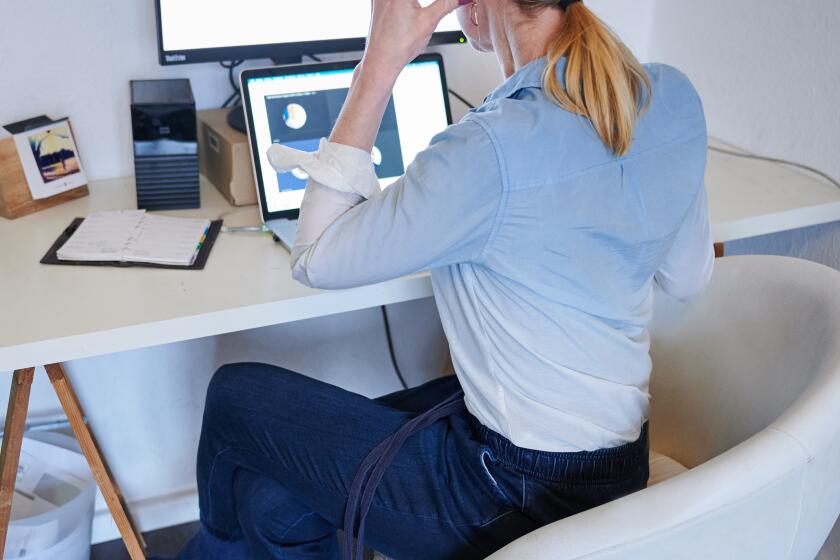Opinion: Struggling to find meaning and happiness at work? Here’s where you may have gone wrong

Once upon a time, work was work: We endured it so that we could eat. But today too many of us have made the mistake of anointing work as our main source of meaning.
Seventy percent of employees say their jobs define their sense of purpose. Meanwhile, my research shows a scant 12.5% of us are “totally and utterly engaged” at work, echoing years of Gallup data.
In other words, we don’t love work, but we want it to love us back. We’ve heard that if we do what we love, we’ll “never work a day,” but we’re burned out to a crisp and not sure what to do about it. We want more from our work than it can realistically give us.
Columbia researchers and NPR found that five minutes of movement every half an hour has substantial health benefits but can be a challenge in many jobs.
We need to stop putting so much pressure on our jobs to make life worth living. How? By taking control of our off-the-clock hours to craft lives that are wide and deep.
We have more agency and opportunity than ever to create vitality in our discretionary time, but we’re not taking advantage of it. While most of us don’t feel “time-affluent,” the average American spends as much as 2.86 hours of every day watching television and 2.3 hours on social media.
Yet our lives are brief. We get an average of only 4,000 Mondays to live, and we roll out of bed to go to work on 2,340 of them.
Opening a room in your home to someone is a generous act that can benefit hosts and guests alike.
Fortunately, we can come to grips with these facts and change what’s left of our lives for the better.
A branding director I worked with, for example, kept waiting for her work to make her “feel whole.” She finally realized that was like waiting for Santa Claus, took the reins and fashioned her version of a well-rounded life. It included practicing meditation, volunteering at a memory care facility and organizing potluck social suppers. Her job became a mere slice of her whole life.
A disengaged senior executive I worked with took a hard look at her one-dimensional, all-work-and-no-play existence and acknowledged, “I need to get a life, don’t I?” She built one by taking salsa lessons and rekindling her sketching hobby.
We’ve been advised to scorn a “job” and even turn up our noses at a “career,” holding out for a “calling.” But can’t the call come from inside the house rather than the office?
Those who bank on promotions, raises and other workplace rewards to deliver happiness inevitably find themselves on a “hedonic treadmill” as each fancy new title loses its luster.
“I finally got the big job I had been pining for,” one executive told me, “and after a month of feeling great, I came home feeling empty inside.” She ultimately came to understand that her ”meaning and sense of mattering” could come from outside her career, started fundraising for her local library and found a wellspring of purpose.
Another launched a podcast for gamers after he started “working to live” instead of “living to work.” He said he felt as if a pressure valve had been opened and he needed fewer affirmations of his value. Living with intention outside work leaves our careers fabulously diminished in perspective.
This isn’t to say we should stay in soul-stabbing jobs that actively harm us. The answer isn’t to settle for unrelenting dysfunction.
But living a truly alive life takes more than a career, including:
Finding flow: Flow is that fabulously engrossing state of mind that occurs when you’re optimally challenged and fully absorbed in an activity. Experienced workers have typically achieved mastery of what they do for a living, so the opportunities to learn and grow at work are fewer than when they were starting out. But flow can be found outside work by, say, picking up glassblowing, learning a new language or earning the next belt in tae kwon do. Bring back the hobby!
Recognizing that life is an inside job: Forty percent of adults identify as “meaningfully bored,” according to my research. We live slumbering existences: work, takeout, Netflix, sleep, repeat. Letting our jobs leave the rest of our lives on autopilot robs us of autonomy, motivation and well-being. We can begin to get away from this by carving out a morsel of time for ourselves to do One Small Thing that makes us feel alive within the next week.
Practicing memento mori: Remembering that we must die and tuning into the finite nature of life helps us see how rare and special it is. Beginning with the “big end” in mind helps us stop taking life for granted. Visualizing one’s deathbed or obituary can be a powerful exercise that serves as a wake-up call. If you died tonight, what might you regret? (Hint: It’s never working too little.)
Do you know how many Mondays you have left? It’s time to do the math. Work can’t and won’t be the exclusive source of our purpose and joy. But we still have time to find both beyond our careers.
Jodi Wellman is a Southern California-based psychologist and executive coach and the author of “You Only Die Once: How to Make It to the End With No Regrets.”
More to Read
A cure for the common opinion
Get thought-provoking perspectives with our weekly newsletter.
You may occasionally receive promotional content from the Los Angeles Times.












